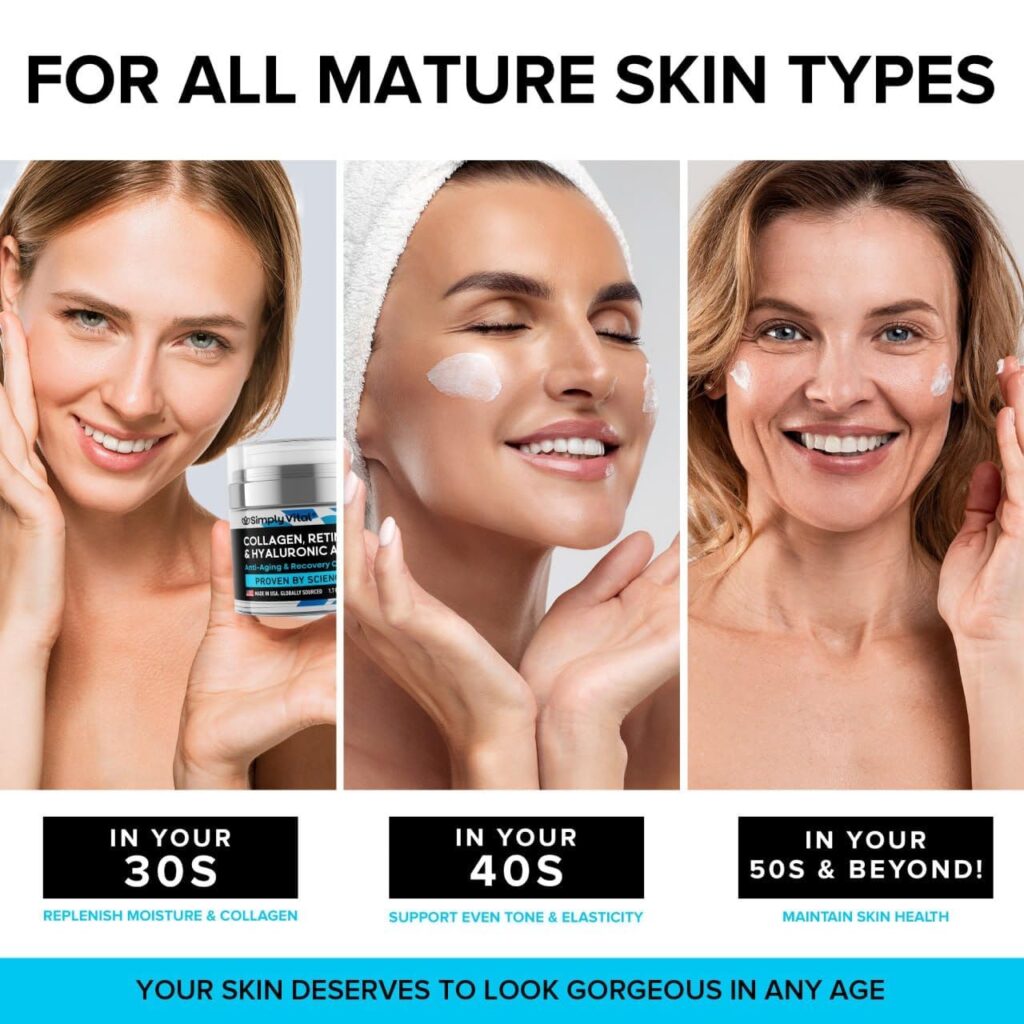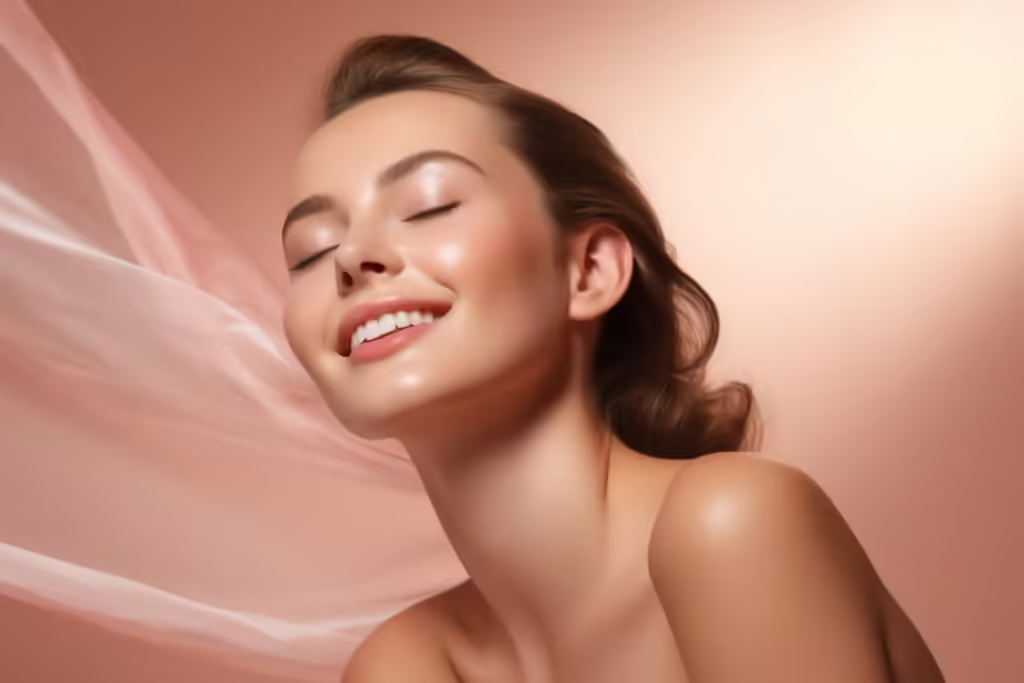To get glowing skin, maintain a balanced diet and follow a consistent skincare routine. Hydrate adequately and protect your skin from the sun. Learn how to get a glowing skin! Learn effective tips, routines, and products to achieve a radiant, healthy complexion fast.
Glowing skin is a result of both internal and external care. Eating nutrient-rich foods, staying hydrated, and following a skincare regimen can significantly improve your skin’s appearance. Cleansing, exfoliating, and moisturizing your skin regularly help remove impurities and dead cells, promoting a radiant look.
Protecting your skin from harmful UV rays by using sunscreen is crucial. Adequate sleep and managing stress also play vital roles in achieving healthy skin. Incorporate antioxidant-rich products to combat free radicals. Consistency in these practices ensures long-lasting results, giving you naturally glowing skin.

Credit: www.youtube.com
Importance Of Skincare
Everyone dreams of having radiant and glowing skin. The secret to achieving this lies in understanding the importance of skincare. Proper skincare not only enhances your appearance but also protects your skin from damage and aging. A consistent daily skincare routine is essential for maintaining a healthy, glowing complexion.
Healthy Skin Benefits
Aiming for healthy skin offers numerous benefits. First, it helps to maintain the skin’s natural barrier, which protects against harmful bacteria and environmental toxins. Healthy skin also retains moisture better, preventing dryness and irritation.
Here are some key benefits:
- Reduced Acne: A proper glowing skin regimen helps to keep pores clean, reducing the occurrence of acne.
- Even Skin Tone: Regular skincare minimizes dark spots and blemishes, promoting an even skin tone.
- Improved Texture: Consistent use of moisturizers and exfoliants results in smoother skin.
- Anti-Aging: Using products with anti-aging ingredients reduces the appearance of fine lines and wrinkles.
Additionally, healthy skin can enhance your overall well-being. When your skin looks good, you feel good. This boosts your confidence and self-esteem.
Consider incorporating the following facial beauty tips into your routine:
- Cleansing twice a day to remove dirt and oil.
- Using a toner to balance the skin’s pH levels.
- Applying a moisturizer to keep the skin hydrated.
- Using sunscreen daily to protect against UV rays.
Impact Of Skincare On Appearance
The impact of skincare on appearance is profound. Good skincare practices can significantly enhance your natural skin glow. They help in maintaining a youthful and vibrant look.
Here are some ways skincare affects your appearance:
| Skincare Practice | Visible Impact |
|---|---|
| Regular Exfoliation | Smoother and brighter skin |
| Hydration | Plump and supple skin |
| Sun Protection | Reduced signs of aging |
| Anti-Aging Products | Fewer wrinkles and fine lines |
Using skin brightening techniques such as masks and serums can improve your skin’s radiance. Additionally, a natural radiance can be achieved by consuming a healthy diet rich in fruits and vegetables. Hydration is crucial, so drink plenty of water throughout the day.
Remember, the key to a glowing complexion lies in consistency. Regular and dedicated efforts in skincare lead to long-lasting results. Embrace these glowing complexion techniques and enjoy the transformation in your skin’s appearance.
Understanding Skin Types
Achieving glowing skin starts with understanding your unique skin type. Knowing your skin type helps you choose the right products and skin rejuvenation methods. This guide breaks down how to identify your skin type and tailor your skincare routine for a radiant complexion.
Identifying Your Skin Type
Identifying your skin type is the first step towards a glowing skin regimen. Your skin type can fall into one of five main categories: normal, oily, dry, combination, and sensitive. Each type has distinct characteristics.
- Normal Skin: Balanced moisture, few imperfections, and a radiant complexion.
- Oily Skin: Enlarged pores, a shiny appearance, and a tendency to acne.
- Dry Skin: Flaky patches, rough texture, and tightness.
- Combination Skin: Oily in the T-zone (forehead, nose, chin) and dry on the cheeks.
- Sensitive Skin: Redness, itching, and prone to irritation.
To determine your skin type, start with a simple test:
- Wash your face with a mild cleanser and pat dry.
- Wait an hour without applying any products.
- Observe your skin in a mirror under natural light.
Based on your observations, use the above list to classify your skin. Identifying your skin type is essential for selecting the right products and treatments for your skin glow regimen.
Tailoring Skincare To Your Skin Type
Once you’ve identified your skin type, it’s time to tailor your skincare routine. Here are some glowing skin tips for each type:
| Skin Type | Skincare Tips |
|---|---|
| Normal Skin | Use a gentle cleanser twice a day.Apply a light, hydrating moisturizer.Exfoliate weekly for skin rejuvenation. |
| Oily Skin | Opt for oil-free, non-comedogenic products.Use a foaming cleanser to control shine.Incorporate salicylic acid for acne prevention. |
| Dry Skin | Choose a creamy, hydrating cleanser.Apply a rich moisturizer to lock in moisture.Use a humidifier to add moisture to the air. |
| Combination Skin | Use different products for different areas.Apply a gel-based moisturizer on the T-zone.Use a richer cream on dry areas. |
| Sensitive Skin | Opt for fragrance-free, hypoallergenic products.Use a soothing cleanser to reduce irritation.Apply a calming moisturizer with ingredients like aloe vera. |
Tailoring your skincare routine ensures your skin gets the care it needs. For a lasting facial glow, follow these skin glow tips and enjoy a bright, healthy complexion.
Daily Skincare Routine
Everyone dreams of having glowing skin. Achieving that radiant look requires a dedicated daily skincare routine. Consistency is key to skin rejuvenation methods, ensuring your complexion stays bright and healthy. Here are some glowing skin tips to help you craft the perfect skin glow regimen.
Cleansing
Cleansing is the first step in your daily skincare routine. It removes dirt, oil, and impurities that clog pores and dull your skin.
- Use a gentle cleanser: Harsh cleansers can strip your skin’s natural oils.
- Wash your face twice a day: Cleanse once in the morning and once before bed.
- Use lukewarm water: Hot water can dry out your skin and cause irritation.
Choose a cleanser that suits your skin type:
| Skin Type | Recommended Cleanser |
|---|---|
| Oily | Foaming Cleanser |
| Dry | Hydrating Cleanser |
| Sensitive | Fragrance-Free Cleanser |
Remember, a clean face is a canvas for other skincare products. Regular cleansing helps in skin rejuvenation methods and ensures your complexion brightening efforts are effective.
Moisturizing
Moisturizing is crucial for maintaining your skin’s hydration and barrier. It locks in moisture and keeps your skin soft and supple.
Follow these facial glow tips:
- Choose the right moisturizer: Pick one suitable for your skin type.
- Apply while skin is damp: This helps lock in moisture.
- Don’t forget your neck: Your neck needs hydration too.
Consider these types of moisturizers based on your skin type:
| Skin Type | Recommended Moisturizer |
|---|---|
| Oily | Oil-Free Gel Moisturizer |
| Dry | Thick Cream Moisturizer |
| Combination | Balancing Moisturizer |
Moisturizing is essential in your skin glow regimen. It prevents dryness and keeps your skin looking youthful and vibrant.
Sun Protection
Sun protection is a non-negotiable part of any skincare routine. The sun’s harmful UV rays can cause premature aging and damage.
Follow these glowing skin tips for sun protection:
- Use a broad-spectrum sunscreen: Protects against both UVA and UVB rays.
- Choose SPF 30 or higher: Provides adequate protection.
- Apply generously: Don’t skimp on sunscreen, cover all exposed areas.
Here’s a quick guide:
| Activity Level | SPF Recommendation |
|---|---|
| Daily Use | SPF 30 |
| Outdoor Activities | SPF 50 |
| Swimming | Water-Resistant SPF 50 |
Applying sunscreen daily is a key component of skin rejuvenation methods. It ensures your skin remains healthy and glowing for years to come.

Importance Of Hydration
Everyone wants a natural radiance that shines through their skin. One essential part of achieving this is through proper hydration. Water plays a significant role in maintaining skin health. Incorporating hydration into your daily skincare routine can significantly enhance your facial beauty. Let’s delve into the importance of hydration and how it contributes to a natural skin glow.
Drinking An Adequate Amount Of Water
Drinking enough water is crucial for a natural skin glow. Water helps to flush out toxins from your body, leading to clearer skin. Aim to drink at least 8 glasses of water each day to keep your skin hydrated.
Here are some simple tips to ensure you’re drinking enough water:
- Carry a water bottle with you throughout the day.
- Set reminders to drink water on your phone.
- Incorporate water-rich foods like cucumber and watermelon into your diet.
Water also helps to maintain the elasticity of your skin. This reduces the appearance of wrinkles and fine lines, making your skin look younger. Proper hydration can prevent dry and flaky skin, giving you a smoother complexion.
| Benefits of Drinking Water | Impact on Skin |
|---|---|
| Flushes out toxins | Clearer skin |
| Maintains elasticity | Reduces wrinkles |
| Prevents dryness | Smoother complexion |
Moisturizing From The Inside Out
Moisturizing your skin from the inside out is another essential step in your skincare regimen. What you consume affects your skin’s hydration levels.
Here are some tips to moisturize from the inside out:
- Eat foods rich in omega-3 fatty acids, like salmon and flaxseeds.
- Include fruits and vegetables with high water content in your meals.
- Drink herbal teas, which can also contribute to your daily water intake.
Hydrating from the inside ensures that your skin cells get the moisture they need. This helps to improve your overall facial beauty. Regular hydration can make your skin more resilient to external factors like pollution and sun exposure.
Adding hydrating foods to your diet can also improve your skin texture. Foods like avocados and nuts provide essential nutrients that support skin health. These foods help to lock in moisture, keeping your skin soft and supple.
Incorporate these beauty care tips into your daily routine. This will help you achieve a radiant, glowing skin naturally.
Balanced Diet And Its Impact
Everyone dreams of having a natural radiance that makes their skin glow. While a daily skincare routine and facial beauty tips play an important role, a balanced diet can significantly impact your skin’s health. Let’s dive into how a balanced diet can enhance your natural skin glow.
Incorporating Nutrient-rich Foods
Eating the right foods can help you achieve a natural skin glow. Nutrient-rich foods provide the essential vitamins and minerals your skin needs to stay healthy and radiant.
Here are some foods to include in your diet:
- Fruits and Vegetables: These are high in antioxidants, vitamins, and minerals. Examples include berries, oranges, spinach, and carrots.
- Fatty Fish: Salmon and mackerel are rich in omega-3 fatty acids, which help maintain skin elasticity and hydration.
- Nuts and Seeds: Almonds, walnuts, and chia seeds are great sources of vitamin E and healthy fats.
- Whole Grains: Brown rice, oats, and quinoa provide essential nutrients and fiber.
Including these foods in your diet ensures your skin gets the nutrients it needs for a natural radiance.
Below is a table summarizing the key nutrients and their sources:
| Key Nutrient | Food Source |
|---|---|
| Vitamin C | Oranges, Strawberries, Spinach |
| Vitamin E | Almonds, Sunflower Seeds |
| Omega-3 Fatty Acids | Salmon, Chia Seeds |
| Antioxidants | Berries, Leafy Greens |
Avoiding Skin-damaging Foods
While adding nutrient-rich foods is crucial, avoiding skin-damaging foods is equally important for your skin care regimen.
Here are some foods to avoid:
- Processed Sugars: High sugar levels can lead to inflammation and breakouts.
- Fried Foods: These can clog pores and lead to acne.
- Alcohol: Excessive consumption dehydrates the skin and can cause premature aging.
- Dairy Products: Some people find that dairy can trigger acne and other skin issues.
By avoiding these foods, you reduce the risk of inflammation and other skin issues. This helps maintain your natural radiance.
Here is a table summarizing the foods to avoid and their potential impact on the skin:
| Food to Avoid | Potential Impact |
|---|---|
| Processed Sugars | Inflammation, Breakouts |
| Fried Foods | Clogged Pores, Acne |
| Alcohol | Dehydration, Premature Aging |
| Dairy Products | Acne, Skin Issues |
Adopting these dietary changes can greatly enhance your beauty care and help you achieve a healthy, glowing complexion.
The Role Of Exercise
Everyone wants glowing skin. One effective way is through exercise. Exercise not only keeps your body fit but also plays a crucial role in improving skin health. Let’s explore how physical activity can help you achieve that radiant glow.
Enhancing Blood Circulation
Exercise boosts blood circulation. When you work out, your heart pumps more blood, which helps deliver oxygen and nutrients to your skin. This process enhances your skin’s health and appearance.
Here are some ways exercise enhances blood circulation:
- Cardio exercises: Activities like running, cycling, and swimming increase heart rate, promoting better blood flow.
- Strength training: Lifting weights also enhances circulation by increasing muscle mass and improving blood vessel function.
- Yoga and stretching: These practices help in blood flow by relaxing muscles and reducing tension.
Better circulation can also help in:
| Benefit | Description |
|---|---|
| Detoxification | Improved blood flow helps remove toxins from the body. |
| Oxygen supply | Increased oxygen levels nourish skin cells, making them healthier. |
| Collagen production | Better circulation boosts collagen, which keeps skin firm. |
Reducing Stress For Healthier Skin
Exercise is a powerful stress-reliever. Lower stress levels lead to healthier skin. Stress causes the body to release hormones like cortisol, which can lead to skin problems such as acne and eczema.
How exercise reduces stress:
- Endorphin release: Physical activity triggers the release of endorphins, known as the “happy hormones.”
- Improved sleep: Regular exercise helps you sleep better, reducing stress levels.
- Mental clarity: Activities like running or yoga can clear your mind, reducing anxiety.
Reducing stress through exercise benefits the skin by:
- Lowering cortisol levels: Less cortisol means fewer breakouts and irritation.
- Boosting skin repair: Reduced stress promotes faster healing of skin issues.
- Enhancing overall appearance: Stress-free life leads to a glowing, vibrant complexion.
By incorporating regular exercise into your routine, you can significantly improve your skin’s health and appearance.
Importance Of Quality Sleep
Getting glowing skin isn’t just about creams and serums. One of the most underrated aspects of achieving radiant skin is quality sleep. Quality sleep plays a vital role in skin health. It helps with skin repair, regeneration, and overall appearance. Let’s dive into why a good night’s sleep is essential for your skin.
Skin Repair And Regeneration During Sleep
During sleep, your skin undergoes a process of repair and regeneration. This is crucial for maintaining a healthy complexion. Here’s why:
- Cell Turnover: Skin cells renew themselves more rapidly at night.
- Collagen Production: Boosts collagen production, reducing wrinkles and sagging.
- Blood Flow: Enhanced blood flow ensures nutrients reach skin cells.
Let’s break down the process:
| Time | Process |
|---|---|
| 10 PM – 2 AM | Peak cell turnover and repair |
| 2 AM – 4 AM | Increased collagen production |
| 4 AM – 6 AM | Blood flow reaches its peak |
Without proper sleep, the skin can appear dull and tired. Dark circles and puffiness are more noticeable. Consistent sleep deprivation can lead to more serious skin issues like acne and eczema.
Tips For Improving Sleep Quality
Improving sleep quality can have a profound impact on your skin. Here are some tips to ensure you get the best sleep possible:
- Stick to a Sleep Schedule: Go to bed and wake up at the same time every day.
- Create a Bedtime Routine: Engage in relaxing activities like reading or a warm bath.
- Optimize Your Sleep Environment: Keep your bedroom cool, dark, and quiet.
- Limit Screen Time: Avoid screens at least an hour before bed.
- Watch Your Diet: Avoid caffeine and heavy meals before bedtime.
Here’s a simple checklist to help improve your sleep quality:
| Task | Action |
|---|---|
| Consistent Sleep Schedule | Set reminders for bed and wake-up times |
| Relaxing Routine | Incorporate calming activities |
| Sleep Environment | Adjust temperature, lighting, and noise |
| Screen Time | Limit use an hour before bed |
| Diet | Avoid caffeine and heavy meals |
Implementing these tips can lead to better sleep, resulting in healthier, glowing skin. By prioritizing quality sleep, you’re investing in your skin’s long-term health and beauty.
Effective Skincare Products
Everyone dreams of glowing skin. Effective skincare products make this dream a reality. These products work wonders if you choose the right ones for your skin type. Let’s explore how to select the best products for radiant skin.
Understanding Ingredients
Knowing the ingredients in skincare products is vital. Some ingredients are universally beneficial, while others cater to specific skin needs. Here are some key ingredients to look for:
- Hyaluronic Acid: Keeps skin hydrated and plump.
- Vitamin C: Brightens skin and reduces dark spots.
- Salicylic Acid: Fights acne and unclogs pores.
- Niacinamide: Reduces inflammation and smoothes skin texture.
- Retinol: Fights wrinkles and boosts collagen production.
Not all ingredients suit every skin type. To help you choose, here’s a quick table:
| Ingredient | Skin Type |
|---|---|
| Hyaluronic Acid | All skin types |
| Vitamin C | All skin types |
| Salicylic Acid | Oily, Acne-prone |
| Niacinamide | All skin types |
| Retinol | Mature, Acne-prone |
Choosing Products For Your Skin Type
Picking the right products for your skin type is crucial. Here are some tips for different skin types:
- Dry Skin: Use hydrating products with ingredients like hyaluronic acid and glycerin. Cream-based cleansers and rich moisturizers work best.
- Oily Skin: Opt for lightweight, non-comedogenic products. Look for salicylic acid and niacinamide to control oil and prevent breakouts.
- Combination Skin: Use products that balance oil and hydration. Gel-based moisturizers and gentle cleansers are ideal.
- Sensitive Skin: Choose products with soothing ingredients like chamomile and aloe vera. Avoid fragrances and harsh chemicals.
- Normal Skin: Maintain a balanced routine with hydrating and nourishing products. Use ingredients like vitamin C for added glow.
Here’s a sample skincare routine for different skin types:
| Skin Type | Morning Routine | Night Routine |
|---|---|---|
| Dry | Gentle cleanser, Hydrating serum, Moisturizer, SPF | Gentle cleanser, Hydrating serum, Rich moisturizer |
| Oily | Foaming cleanser, Niacinamide serum, Lightweight moisturizer, SPF | Foaming cleanser, Salicylic acid serum, Lightweight moisturizer |
| Combination | Gel cleanser, Balancing serum, Gel moisturizer, SPF | Gel cleanser, Balancing serum, Gel moisturizer |
| Sensitive | Gentle cleanser, Soothing serum, Lightweight moisturizer, SPF | Gentle cleanser, Soothing serum, Lightweight moisturizer |
| Normal | Gentle cleanser, Vitamin C serum, Moisturizer, SPF | Gentle cleanser, Hydrating serum, Moisturizer |
Professional Skincare Treatments
Everyone dreams of having glowing skin. Achieving that radiant look often requires more than just home remedies. Professional skincare treatments can provide the extra boost your skin needs. These treatments offer specialized care, tailored to your skin type and concerns.
Facials And Their Benefits
Facials are a popular professional skincare treatment. They involve multiple steps designed to cleanse, exfoliate, and nourish your skin. Here are some key benefits of getting regular facials:
- Deep Cleansing: Facials remove dirt and oil from deep within your pores.
- Exfoliation: Exfoliating during a facial helps to remove dead skin cells.
- Hydration: Facials provide intense hydration, making your skin look plump and fresh.
- Improved Blood Circulation: Facial massages improve blood flow, giving your skin a natural glow.
- Anti-Aging: Regular facials can reduce fine lines and wrinkles.
Facials can be customized to suit your specific skin needs. Here’s a table showing different types of facials and their benefits:
| Type of Facial | Benefit |
|---|---|
| Hydrating Facial | Boosts moisture levels |
| Anti-Aging Facial | Reduces wrinkles |
| Acne Facial | Clears breakouts |
| Brightening Facial | Improves skin tone |
Importance Of Dermatologist Consultation
Consulting a dermatologist is crucial for maintaining healthy, glowing skin. Dermatologists are skin experts who can diagnose and treat various skin conditions. Here are some reasons why you should see a dermatologist:
- Accurate Diagnosis: Dermatologists can identify skin issues that you might not notice.
- Customized Treatment: They can recommend treatments tailored to your skin type and concerns.
- Prevention: Regular check-ups can help in the early detection of serious conditions like skin cancer.
- Expert Advice: Dermatologists provide advice on the best skincare products and routines.
Visiting a dermatologist can also save you time and money. Instead of trying multiple over-the-counter products, you get a precise treatment plan. This ensures that you achieve glowing skin faster and more effectively. Here is a quick comparison of home remedies vs. dermatologist consultations:
| Aspect | Home Remedies | Dermatologist Consultation |
|---|---|---|
| Accuracy | Trial and error | Precise diagnosis |
| Effectiveness | Variable | High |
| Cost | Low | Varies |
| Time | Long | Short |
In summary, professional skincare treatments and dermatologist consultations are essential steps to achieving glowing skin.
Natural Remedies For Glowing Skin
Everyone dreams of having glowing skin. Natural remedies can help achieve this without using harsh chemicals. These remedies are cost-effective, easy to find, and gentle on the skin. Let’s explore how natural ingredients can give your skin a radiant glow.
Benefits Of Natural Ingredients
Natural ingredients offer a range of benefits for your skin. They are free from harmful chemicals and provide essential nutrients. Here are some key benefits:
- Hydration: Natural oils like coconut and olive oil keep the skin hydrated.
- Antioxidants: Ingredients like green tea and berries fight free radicals.
- Anti-inflammatory: Aloe vera and chamomile reduce redness and irritation.
- Gentle: Natural ingredients are less likely to cause allergies or breakouts.
Here’s a table showcasing some effective natural ingredients and their benefits:
| Ingredient | Benefit |
|---|---|
| Honey | Moisturizes and heals the skin |
| Turmeric | Brightens and fights bacteria |
| Oatmeal | Soothes and exfoliates |
| Yogurt | Exfoliates and nourishes |
Diy Skincare Recipes
Creating DIY skincare recipes is fun and effective. You can use ingredients from your kitchen. Here are some easy recipes:
1. Honey and Lemon Face Mask:
- Ingredients: 1 tablespoon honey, 1 teaspoon lemon juice
- Instructions: Mix honey and lemon juice. Apply to your face. Leave for 15 minutes. Rinse with warm water.
2. Oatmeal Scrub:
- Ingredients: 2 tablespoons oatmeal, 1 tablespoon yogurt, 1 teaspoon honey
- Instructions: Combine all ingredients. Gently scrub your face in circular motions. Rinse off with cool water.
3. Turmeric and Yogurt Mask:
- Ingredients: 1 teaspoon turmeric, 2 tablespoons yogurt
- Instructions: Mix turmeric and yogurt. Apply to your skin. Let it sit for 10-15 minutes. Rinse with lukewarm water.
These DIY recipes are simple and can make your skin glow. Try them and see the difference!
Dealing With Common Skin Issues
Achieving glowing skin can be challenging. Many struggle with common skin issues that affect their confidence and appearance. Tackling these problems is essential for a radiant complexion. This section delves into managing acne and addressing dry or oily skin effectively.
Acne Management
Acne is a widespread skin issue that affects many people. It can be caused by various factors, including hormonal changes, diet, and poor skincare habits. To manage acne effectively, consider the following tips:
- Maintain a Clean Face: Wash your face twice daily with a gentle cleanser. Avoid harsh scrubbing, which can irritate the skin.
- Use Non-Comedogenic Products: These products are less likely to clog pores and cause breakouts.
- Stay Hydrated: Drinking plenty of water helps keep your skin hydrated and can reduce the risk of acne.
- Avoid Touching Your Face: Hands can transfer dirt and oil to your skin, leading to breakouts.
- Healthy Diet: Eat a balanced diet rich in fruits, vegetables, and whole grains. Avoid excessive sugar and dairy.
Here is a simple table summarizing some effective acne management tips:
| Tip | Description |
|---|---|
| Maintain a Clean Face | Wash twice daily with a gentle cleanser. |
| Use Non-Comedogenic Products | Products that do not clog pores. |
| Stay Hydrated | Drink plenty of water. |
| Avoid Touching Your Face | Prevent dirt and oil transfer. |
| Healthy Diet | Eat fruits, vegetables, and whole grains. |
Addressing Dry Or Oily Skin
Dry or oily skin can be a major hindrance to achieving glowing skin. Each requires different care approaches:
For Dry Skin:
- Moisturize Regularly: Use a rich, hydrating moisturizer twice daily.
- Avoid Hot Showers: Hot water can strip the skin of its natural oils.
- Use Gentle Cleansers: Choose cleansers that do not contain harsh chemicals.
- Humidify Your Home: Adding moisture to the air can help keep your skin hydrated.
For Oily Skin:
- Use Oil-Free Products: Look for products labeled as oil-free or mattifying.
- Blot Away Excess Oil: Use blotting papers to remove excess oil during the day.
- Exfoliate Regularly: Exfoliate 1-2 times a week to remove dead skin cells and prevent clogged pores.
- Clay Masks: Use clay masks to absorb excess oil and reduce shine.
By understanding and addressing these common skin issues, achieving glowing skin becomes much more manageable.

Credit: skinkraft.com
Sun Protection And Skincare
To achieve glowing skin, proper sun protection and skincare are essential. The sun’s rays can damage your skin, causing premature aging and sunburns. Incorporating sun protection into your daily routine can help you maintain healthy and radiant skin.
Understanding Spf And Its Importance
SPF stands for Sun Protection Factor. It measures how well a sunscreen will protect your skin from harmful UVB rays. These rays cause sunburn and contribute to skin cancer.
Using sunscreen with an appropriate SPF is crucial. Here’s why:
- Prevents Sunburn: SPF protects your skin from getting red and sore.
- Reduces Skin Cancer Risk: Regular use lowers the risk of developing skin cancer.
- Prevents Premature Aging: Protects against wrinkles and sunspots.
Choosing the right SPF can be confusing. Here’s a simple guide:
| Skin Type | Recommended SPF |
|---|---|
| Fair Skin | SPF 30 or higher |
| Medium Skin | SPF 15-30 |
| Dark Skin | SPF 15 |
Always choose a broad-spectrum sunscreen. It protects against both UVA and UVB rays. Apply generously and reapply every two hours, especially after swimming or sweating.
Tips For Sun Protection
Protecting your skin from the sun involves more than just sunscreen. Here are some tips:
- Wear Protective Clothing: Long sleeves, hats, and sunglasses shield your skin.
- Seek Shade: Avoid direct sunlight between 10 AM and 4 PM. The sun is strongest during these hours.
- Use Sunglasses: Protect your eyes from harmful rays.
- Avoid Tanning Beds: They emit harmful UV rays and increase skin cancer risk.
- Check the UV Index: Plan outdoor activities when the UV index is low.
Incorporate these tips into your daily routine for optimal protection. Stay consistent and make sun protection a habit. Your skin will thank you with a healthy, glowing appearance.
Caring For Sensitive Skin
Everyone dreams of having glowing skin. For those with sensitive skin, achieving this can be a challenge. Sensitive skin requires extra care and attention to stay healthy and radiant. This section will guide you on how to care for sensitive skin, ensuring it remains glowing and beautiful.
Gentle Skincare Practices
For sensitive skin, gentle skincare practices are crucial. Avoid harsh scrubbing as it can damage the skin barrier. Opt for mild cleansers that are free from sulfates and fragrances.
Here are some gentle skincare practices to follow:
- Use lukewarm water: Hot water can strip natural oils, causing dryness and irritation.
- Pat your skin dry: Rubbing your skin with a towel can cause redness and irritation. Always pat dry gently.
- Moisturize daily: Apply a fragrance-free, hypoallergenic moisturizer to lock in hydration.
- Patch test new products: Test new skincare products on a small area before applying them to your face.
A simple skincare routine can work wonders for sensitive skin. Here’s a basic routine to follow:
| Step | Product Type | Frequency |
|---|---|---|
| Cleanse | Mild, sulfate-free cleanser | Twice daily |
| Tone | Alcohol-free toner | Once daily |
| Moisturize | Fragrance-free moisturizer | Twice daily |
| Sunscreen | Broad-spectrum SPF 30 | Daily |
Avoiding Irritants
Sensitive skin is prone to irritation. It is essential to identify and avoid common irritants. Fragrances, dyes, and alcohol are common culprits that can cause reactions.
Follow these tips to avoid skin irritants:
- Read product labels: Look for products labeled “fragrance-free” and “hypoallergenic”.
- Avoid harsh chemicals: Steer clear of products containing alcohol, parabens, and sulfates.
- Choose natural ingredients: Opt for products with natural, soothing ingredients like aloe vera and chamomile.
- Limit makeup use: Heavy makeup can clog pores and irritate sensitive skin. Use mineral makeup if possible.
Environmental factors can also irritate sensitive skin. Protect your skin from the sun by wearing broad-spectrum sunscreen and protective clothing. Avoid extreme temperatures as they can trigger sensitivity.
Here’s a quick list of irritants to avoid:
- Fragrances
- Alcohol-based products
- Harsh exfoliants
- Strong detergents
- Artificial dyes
By avoiding these irritants, you can keep your sensitive skin calm and glowing.
Embracing Consistency In Skincare
Having glowing skin is a goal for many. Consistency in skincare is key to achieving that natural radiance. A dedicated approach in your daily skincare routine can bring transformative results. Embrace consistency and watch your skin shine with a healthy, natural glow.
Establishing A Routine
Creating a daily skincare routine is essential for achieving radiant skin. Start with a simple regimen and stick to it. Here are some crucial steps:
- Cleanse: Use a gentle cleanser to remove dirt and impurities.
- Tone: Apply a toner to balance the skin’s pH levels.
- Moisturize: Hydrate your skin with a suitable moisturizer.
- Protect: Always use sunscreen to guard against UV damage.
Consistency is vital. Follow these steps every morning and night. A regular routine helps maintain your skin’s health and appearance.
For better results, consider incorporating the following:
| Morning Routine | Evening Routine |
|---|---|
| Cleanser | Cleanser |
| Toner | Toner |
| Moisturizer | Moisturizer |
| Sunscreen | Night Cream |
Establishing a routine is the foundation of effective beauty care. It ensures that your skin gets the consistent attention it needs to stay healthy and glowing.
Adopting Long-term Habits
For a natural skin glow, adopt long-term habits. These habits enhance your skin’s health and beauty over time. Here are some facial beauty tips:
- Stay Hydrated: Drink plenty of water daily.
- Eat Healthy: Consume a balanced diet rich in vitamins and minerals.
- Get Enough Sleep: Aim for 7-8 hours of sleep each night.
- Exercise Regularly: Physical activity promotes blood circulation, boosting your skin’s radiance.
Long-term habits complement your daily skincare regimen. They ensure that your skin stays vibrant and youthful. Here are additional tips:
- Avoid Smoking: Smoking damages skin and accelerates aging.
- Limit Alcohol: Excessive alcohol intake dehydrates the skin.
- Reduce Stress: Practice stress-relief techniques like meditation and yoga.
Adopting these habits not only improves your skin but also enhances your overall well-being. Consistency in these areas ensures long-lasting beauty and health for your skin.
Maintaining Healthy Skincare Habits
Everyone dreams of having glowing skin. Maintaining healthy skincare habits is the key to achieving that radiant look. These habits ensure your skin remains vibrant, healthy, and free from common issues like acne and dryness. Let’s explore the essentials of maintaining healthy skincare habits.
Monitoring Skin Changes
Paying attention to your skin is crucial. Your skin can change due to various factors such as age, diet, weather, and stress. Regularly monitoring these changes helps you adjust your skincare routine accordingly. Here are a few tips to effectively monitor your skin:
- Daily Inspection: Check your skin every morning and night.
- Note Any Redness: Red patches could indicate irritation or allergies.
- Track Breakouts: Keep a diary of any acne spots.
- Hydration Levels: Notice if your skin feels dry or oily.
A simple table can help you track these changes:
| Date | Skin Condition | Notes |
|---|---|---|
| 01/01/2023 | Dry | Weather is cold, need more moisturizer |
| 01/02/2023 | Oily | Had fried food, breakout on chin |
Regular monitoring helps you detect and address issues early. It also allows you to understand what works best for your skin. Consistency is key. Make it a habit to observe and note changes.
Adapting Skincare Practices
Adapting your skincare practices is essential to maintain glowing skin. Your skin’s needs can change due to many factors. Adapting helps you stay ahead of any potential issues. Here’s how to do it:
- Seasonal Changes: Use heavier moisturizers in winter and lighter ones in summer.
- Diet Adjustments: Include more fruits and vegetables for better skin health.
- Product Rotation: Rotate products to suit your current skin needs.
- Hydration: Drink plenty of water to keep your skin hydrated.
For example, during the colder months, your skin might need more moisture. Switch to a thicker cream to prevent dryness. In summer, use lighter lotions to avoid excess oil production. Adjusting your diet also makes a significant difference. Eating more fruits and vegetables supplies your skin with essential vitamins and minerals.
Here’s a simple product rotation chart:
| Season | Product Type | Frequency |
|---|---|---|
| Winter | Heavy Moisturizer | Daily |
| Summer | Light Lotion | Daily |
By adapting your skincare practices to fit your skin’s needs, you ensure that it remains healthy and glowing all year round. Regularly updating your routine based on your skin’s condition keeps it balanced and radiant.
Frequently Asked Questions: How to Get a Glowing Skin
How Can I Achieve Glowing Skin Naturally?
Eat a balanced diet, stay hydrated, and use natural skincare products like aloe vera and honey.
What Foods Promote Glowing Skin?
Consume fruits, vegetables, nuts, and seeds rich in antioxidants, vitamins A, C, and E, and omega-3 fatty acids.
How Often Should I Exfoliate My Skin?
Exfoliate your skin 2-3 times per week to remove dead skin cells and promote a radiant complexion.
Which Skincare Routine Ensures Glowing Skin?
Cleanse, tone, and moisturize daily. Use sunscreen, exfoliate regularly, and apply a hydrating serum.
Can Drinking Water Improve Skin Glow?
Yes, drinking plenty of water keeps the skin hydrated, flushes out toxins, and enhances skin elasticity and glow.
What Are The Best Home Remedies For Glowing Skin?
Apply honey masks, use turmeric and yogurt packs, and massage with coconut oil for natural radiance.
Conclusion
Achieving glowing skin is possible with the right care routine. Follow these tips to enhance your natural beauty. Consistency is key for lasting results. Hydrate, eat well, and use suitable skincare products. With dedication, your skin will radiate health and vitality, making you feel confident and beautiful.






